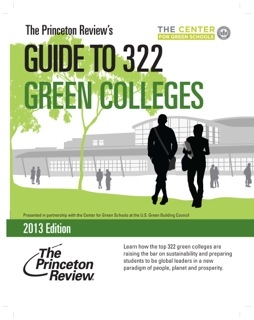Tuesday, Apr 16, 2013
Rider University is one of the 322 most environmentally responsible institutions of higher education in the United States and Canada, according to The Princeton Review, which included the University in its annual guide to green colleges.
by Sean Ramsden
Rider University is one of the most environmentally responsible colleges in the United States and Canada, according to The Princeton Review. The renowned education services company selected Rider for inclusion in the newly released, fourth annual edition of its free downloadable book, The Princeton Review’s Guide to 322 Green Colleges: 2013 Edition, which was released on April 16.
The Princeton Review chose the schools for this guide based on a 50-question survey it conducted in 2012 of administrators at hundreds of four-year colleges. The company analyzed data from the survey about the schools’ course offerings, campus infrastructure, activities and career preparation to measure their commitment to the environment and to sustainability. (Notes on how schools were chosen follow below.)
Published just days prior to Rider’s April 22 Earth Day Celebration, the 215-page guide is the only free comprehensive resource of its kind. It can be downloaded at www.princetonreview.com/green-guide and www.centerforgreenschools.org/greenguide.
The 322 school profiles in the guide feature essential information for applicants, including facts and statistics on school demographics, admissions, and financial aid, as well as details of the schools’ specific sustainability initiatives. A “Green Facts” sidebar reports on a wide range of topics from the school’s use of renewable energy sources, recycling and conservation programs to the availability of environmental studies and career guidance for green jobs.
The Princeton Review first created this one-of-a-kind resource for college-bound students in 2010 with the U.S. Green Building Council (www.usgbc.org), which is best known for developing The Leadership in Energy and Environmental Design (LEED) standard for green building certification. In the fall of 2010, USGBC launched its Center for Green Schools (www.centerforgreenschools.org) to increase its efforts to drive change in how campuses and schools are designed, constructed and operated so that all educational facilities can enhance student learning experiences.
Rider joins the ranks of outstanding universities and colleges nationwide that are leading the “green” movement through their own special programs and initiatives.
Rider pledged to meet the USGBC’s LEED standards when President Mordechai Rozanski signed the American College & University Presidents Climate Commitment, directing that all further new campus construction would be LEED certified. The University’s West Village Residence Halls, which opened in fall 2009 on the Lawrenceville campus, represented the first new construction since the Climate Commitment was signed by Rozanski. They were certified LEED Silver shortly after their completion.
In fall 2011, the 21,000-square-foot North Hall academic building was also completed, meeting LEED Gold certification standards. West Village and North Hall were both designed by Spiezle Architectural Group, Inc., an award-winning, full-service architectural and sustainable design firm from Trenton. Spiezle is noted for its expertise in and commitment to sustainable construction.
Rider’s Lawrenceville campus is also home to a .74-megawatt (MW) solar farm that includes more than 2,600 ground-mounted crystalline solar panels connected directly to PSE&G’s power grid and provide enough electricity to power about 125 homes annually. The solar farm was completed in fall 2011.
“We are truly pleased to recommend Rider University along with all of the fine schools in this book to the many students seeking colleges that practice and promote environmentally-responsible choices and” said Robert Franek, senior vice president and publisher of The Princeton Review.
Franek also noted his company’s recent survey findings indicating significant interest among college applicants in attending green colleges and universities. “Among 9,955 college applicants who participated in our 2013 ‘College Hopes & Worries Survey,’ 62 percent said having information about a school’s commitment to the environment would influence their decision to apply to or attend the school,” he said.
The Princeton Review chose the schools based on a survey it conducted of hundreds of colleges across the U.S. and in Canada in 2012 to tally its “Green Ratings” (scores from 60 to 99) it reports in school profiles in its annual college guidebooks and website. The survey asked administrators more than 50 questions about their institution's sustainability-related policies, practices and programs. The Company reported Green Ratings for 806 institutions in summer 2012. The 322 schools in this guide received scores of 83 or above in that assessment.
It should be noted that The Princeton Review does not rank the schools in this guide from 1 to 322, nor does it include their Green Rating scores in the book’s school profiles. Information about The Princeton Review’s Green Rating methodology and its “Green Honor Roll” saluting 21 schools that received Green Ratings of 99 is at www.princetonreview.com/green.aspx
The Princeton Review is not affiliated with Princeton University and is not a magazine.

